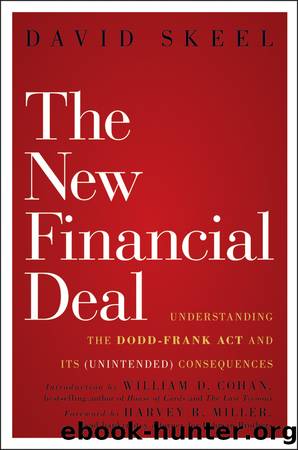The New Financial Deal by David Skeel

Author:David Skeel
Language: eng
Format: epub
Publisher: Wiley
Published: 2010-11-16T00:00:00+00:00
Toasters and Credit Cards
The articleâs central motif was the contrast between toasters, which are effectively regulated, and consumer finance, which isnât. âIt is impossible to buy a toaster that has a one-in-five chance of bursting into flames and burning down your house,â Warren began. âBut it is possible to refinance an existing home with a mortgage that has the same one-in-five chance of putting the family out on the streetâand the mortgage wonât even carry a disclosure of that fact to the homeowner. Similarly,â she continued, âitâs impossible to change the price on a toaster once it has been purchased. But long after the papers have been signed, it is possible to triple the price of the credit used to finance the purchase of that appliance.â Why, Warren asked, are customers protected when they buy toasters, but not âwhen they sign up for routine financial products like mortgages and credit cards?â10
The answer, Warren argued, is that consumer goods are carefully regulated by the Consumer Product Safety Commission, whereas mortgages and credit cards âare regulated by a tattered patchwork of federal and state laws that have failed to adapt to changing markets.â The logical solution, she contended, was to establish a new regulator with the authority to provide the same kind of protection regarding mortgages and credit cards that consumers have with toasters and other appliances. Such an agency âwould promote the benefits of free markets by assuring that consumers can enter credit markets with confidence that the products they purchase meet minimum safety standards.â11
The following year, Warren published a more detailed and scholarly (with many more footnotes, in other words) version of her proposal with another law professor, Oren Bar-Gill of New York University. In the more recent article, Warren and Bar-Gill surveyed a wide range of data about credit card use. Drawing on recent work in behavioral economicsâwhich explores cognitive biases that can systemically distort consumersâ decision makingâthey argued that new disclosure requirements would not be sufficient to protect consumers. Because consumers often underestimate the likelihood they will miss future payments, for instance, simply requiring lenders to disclose the potential fees is not enough. Nor could existing regulators adequately champion consumersâ interests. Because of its concern for the financial health of banks, which may benefit from practices that gouge consumers, the Federal Reserve faced an intractable conflict of interest; and the other regulators with a stake in consumer regulation had similar conflicts, and only limited authority, or were spread too thin. Financial institutions also were able to play one regulator off another, due to the fragmentation of banking regulation among state and federal regulators. Consumers needed a new, unconflicted regulator to protect their interests.12
With the enactment of the Dodd-Frank Act, this is precisely what they got.
Download
This site does not store any files on its server. We only index and link to content provided by other sites. Please contact the content providers to delete copyright contents if any and email us, we'll remove relevant links or contents immediately.
Zero to IPO: Over $1 Trillion of Actionable Advice from the World's Most Successful Entrepreneurs by Frederic Kerrest(4503)
Machine Learning at Scale with H2O by Gregory Keys | David Whiting(4292)
Never by Ken Follett(3935)
Harry Potter and the Goblet Of Fire by J.K. Rowling(3845)
Ogilvy on Advertising by David Ogilvy(3599)
Shadow of Night by Deborah Harkness(3356)
The Man Who Died Twice by Richard Osman(3070)
Book of Life by Deborah Harkness(2929)
The Tipping Point by Malcolm Gladwell(2910)
Will by Will Smith(2906)
0041152001443424520 .pdf by Unknown(2843)
My Brilliant Friend by Elena Ferrante(2824)
Purple Hibiscus by Chimamanda Ngozi Adichie(2812)
How Proust Can Change Your Life by Alain De Botton(2803)
How to Pay Zero Taxes, 2018 by Jeff A. Schnepper(2646)
Hooked: A Dark, Contemporary Romance (Never After Series) by Emily McIntire(2544)
Rationality by Steven Pinker(2350)
Can't Hurt Me: Master Your Mind and Defy the Odds - Clean Edition by David Goggins(2319)
Borders by unknow(2301)
